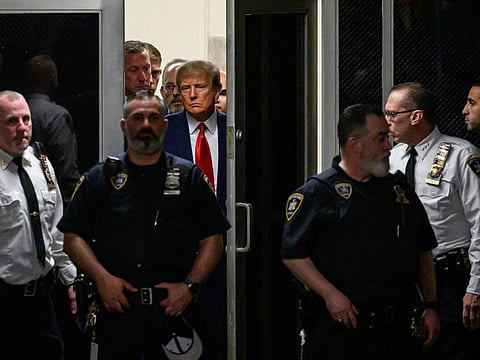Trump indicted in secret documents case. Here are 3 big take-aways
Historic moment as a former US President is charged federally for the first time

History is being made as a former US president faces federal charges for the very first time.
This unprecedented event marks a significant milestone in America's legal and political landscape. The charges against Donald Trump, which have not yet been disclosed to the public, signal a unique and groundbreaking development.
Trump announced on Thursday that he has been indicted in a criminal investigation concerning his handling of classified documents after leaving office. This comes at a time when the former president is considered the front-runner for the 2024 GOP presidential nomination.
According to Trump's statement on Truth Social, he has been summoned to appear in the federal courthouse in Miami next Tuesday. The former president has expressed his intention to plead not guilty to the charges.
Classified national security material
Trump's attorney, Jim Trusty, told mdedia that they received a court summons along with a summary sheet outlining seven charges. While the specific details have not been disclosed, the charges could potentially include violations of the Espionage Act, obstruction of justice, and making false statements. Trusty also mentioned the possibility of a conspiracy charge.
The events leading up to the indictment began approximately one year ago when the FBI conducted a search of Trump's Mar-a-Lago residence.
The search was focused on investigating whether any classified national security materials were unlawfully taken to the location. During the search, the National Archives and Record Administration retrieved over 100 classified documents from Mar-a-Lago, some of which were marked with classification designations.
Here are three big take-aways from this development:
1) At present, we don't know the full extend of the charges against Trump. However, given the nature of the case, there is speculation that the charges may potentially encompass espionage-related offenses. It's important to note that this situation differs from the hush money indictment that took place in New York City in April, which was pursued at the state level. That case is scheduled to proceed to trial next year. In contrast, this latest development constitutes a federal case, representing a higher level of legal significance.
2) Trump becomes the first former president in US history to face federal charges. The indictment poses significant implications for Trump's political future. Since he is a prominent figure within the Republican Party, and a leading candidate for the 2024 presidential nomination, the outcome of this particular trial is expected to have far-reaching consequences in shaping the US political landscape in the coming years.
3) The US Constitution does not contain a specific provision that prohibits individuals who have been indicted, convicted of a crime, or are currently serving a prison sentence from running for or being elected as president. This creates a unique scenario where, theoretically, anyone, regardless of their criminal background, could potentially hold the highest office in the nation. However, the US Constitution does not offer clear guidance on how such a situation should be handled if a person with a criminal history were to win the presidency.


